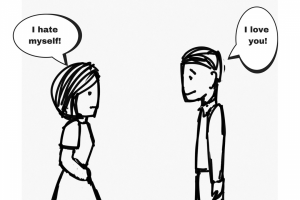Getting the Love You Want
Breaking patterns to achieve better relationships
 Two questions I’ve heard frequently in my 30-plus years working with clients are “Why do my attempts at relationships keep ending in failure?” and “Are my standards too high? No one I want seems to want me.” The truth is that we all have different internal struggles that get in our way when it comes to finding and maintaining the love we say we want. However, there are certain patterns we bring to our relationships that are based on our past and that often lead us to the same relationship outcomes. The good news is, if we can be open, curious, and willing to explore these patterns and where they come from, we can take a great deal of power over our romantic lives. We can change our romantic destiny and enjoy closer, healthier, and more fulfilling relationships.
Two questions I’ve heard frequently in my 30-plus years working with clients are “Why do my attempts at relationships keep ending in failure?” and “Are my standards too high? No one I want seems to want me.” The truth is that we all have different internal struggles that get in our way when it comes to finding and maintaining the love we say we want. However, there are certain patterns we bring to our relationships that are based on our past and that often lead us to the same relationship outcomes. The good news is, if we can be open, curious, and willing to explore these patterns and where they come from, we can take a great deal of power over our romantic lives. We can change our romantic destiny and enjoy closer, healthier, and more fulfilling relationships.
Understanding and changing unhealthy relationship habits involves looking into our past. The first thing we can do is explore our attachment history. The attachments we experience at the start of our lives serve as models for how we expect to be treated. Our early attachment patterns help establish how we feel about ourselves as well as how we think we have to behave in order to get what we want and need in life and in relationships.
For example, having a parent who was intermittently available or emotionally hungry toward us can leave us with an anxious attachment. We may have felt worried, like we had to work extra hard to get noticed, to get their attention, to feel safe, seen, or soothed. As a result, we may grow up feeling insecure toward our romantic partners, believing we have to make things happen, being preoccupied and unsure of whether they love us, often anticipating disappointment or rejection.
On the other hand, if we had a parent who was emotionally neglectful or unavailable, that may have led us to form an avoidant attachment in which we disconnected from having needs, because it was too painful, frustrating, and shame-inducing to feel them. As adults, we may grow up to feel pseudo-independent, distrusting, or dismissing of others, wary of closeness and intolerant of others having needs. With romantic partners, we may create emotional distance and feel uncomfortable with them wanting anything from us.
The ways we were treated when we were young led us to establish certain defenses that were adaptive to our early environment but go on to serve as barriers in our adult relationships. Understanding our adaptations and attachment pattern can give us valuable information about what we bring to our relationships. How are these experiences affecting who I choose or the ways I view my partner? How do they influence how I act in my relationships? Am I perpetuating an old, negative cycle that leaves me in a state that’s emotionally familiar?
In the research and clinical work my father, psychologist Robert Firestone, and I have done, we have found that people tend to recreate their past in the present. We often accomplish this by selecting, distorting, or provoking our partners to fit with old dynamics and reaffirm negative feelings we’ve long had about ourselves.
Selection – Our initial attractions can be tricky, because sometimes the very thing that compels us toward another person can ultimately be the very thing that hurts us down the line. We may be intrigued by someone who’s “mysterious” and “aloof.” We may feel drawn in by someone who “comes on strong” and “fills the room.” Ultimately, we may find these same traits frustrating when the person turns out to be cold and distant or intrusive and controlling. Without realizing it, we often choose people who play out the other half of a painful dynamic from our past, thus repeating patterns and reaffirming beliefs about relationships.
Distortion – Even when we choose a partner with qualities we love and respect, we may wind up distorting the other person to fit into our preexisting models for relationships. We may perceive their natural interest or attraction toward us as “too much” or “needy.” We may mistake their enthusiasm for other friends or activities as signs of rejection or disinterest. We may misread our partner’s tone or overanalyze their behavior to fit with old expectations and ideas we have about ourselves and relationships. In this way, we are no longer seeing the person for who they are but through a faulty lens based on our own history.
Provocation – In a relationship, we’re rarely aware of the behaviors that we ourselves engage in that provoke our partner to act out patterns from our past. If we grew up feeling rejected, we may act insecure or aggressive in ways that alienate our partner. If we felt intruded on, we may push away our partner, leaving them to feel like they have to be more proactive and pursuing. We may even get our partner to say things to us that represent critical thoughts that were directed toward us early in our lives. For example, if we were treated as incapable as kids, we may grow up with “critical inner voices” telling us we’re stupid or useless. In our relationship, we may start being forgetful or irresponsible in ways that provoke our partner to say and feel things toward us that reaffirm a core, negative sense of our identity.
Through many years of working with couples and individuals who are engaging in these patterns, I have identified methods that help people change their attachment patterns and defensive adaptations that were survival mechanisms when they were young, but that are now serving as barriers to them getting the love they say they want. When they are able to identify their attachment patterns and work through unresolved issues from their past, they can move toward forming secure attachments. When they catch on to the ways they select, distort, and provoke their partners to recreate the climate of their past, they can start to break these patterns by dropping their half of the dynamic and developing ways of relating that reflect who they want to be in their relationships. When people challenge their existing ideas and models they have for relationships, they can have more love in their life, create better relationships, and have more inner security.









Leave a Reply